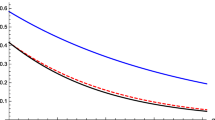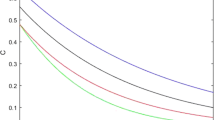Abstract
Monogamy relations characterize the distributions of entanglement in multipartite systems. We investigate monogamy relations related to the concurrence C and the entanglement of formation E. We present new entanglement monogamy relations satisfied by the \(\alpha \)-th power of concurrence for all \(\alpha \ge 2\), and the \(\alpha \)-th power of the entanglement of formation for all \(\alpha \ge \sqrt{2}\). These monogamy relations are shown to be tighter than the existing ones.



Similar content being viewed by others
References
Nielsen, M.A., Chuang, I.L.: Quantum Computation and Quantum Information. Cambridge University Press, Cambridge (2000)
Horodecki, R., Horodecki, P., Horodecki, M., Horodecki, K.: Quantum entanglement. Rev. Mod. Phys. 81, 865 (2009)
Mintert, F., Kuś, M., Buchleitner, A.: Concurrence of mixed bipartite quantum states in arbitrary dimensions. Phys. Rev. Lett. 92, 167902 (2004)
Chen, K., Albeverio, S., Fei, S.M.: Concurrence of arbitrary dimensional bipartite quantum states. Phys. Rev. Lett. 95, 040504 (2005)
Breuer, H.P.: Separability criteria and bounds for entanglement measures. J. Phys. A: Math. Gen. 39, 11847 (2006)
Breuer, H.P.: Optimal entanglement criterion for mixed quantum states. Phys. Rev. Lett. 97, 080501 (2006)
de Vicente, J.I.: Lower bounds on concurrence and separability conditions. Phys. Rev. A 75, 052320 (2007)
Zhang, C.J., Zhang, Y.S., Zhang, S., Guo, G.C.: Optimal entanglement witnesses based on local orthogonal observables. Phys. Rev. A 76, 012334 (2007)
Pawlowski, M.: Security proof for cryptographic protocols based only on the monogamy of bells inequality violations. Phys. Rev. A 82, 032313 (2010)
Koashi, M., Winter, A.: Monogamy of quantum entanglement and other correlations. Phys. Rev. A 69, 022309 (2004)
Osborne, T.J., Verstraete, F.: General monogamy inequality for bipartite qubit entanglement. Phys. Rev. Lett. 96, 220503 (2006)
Bai, Y.K., Ye, M.Y., Wang, Z.D.: Entanglement monogamy and entanglement evolution in multipartite systems. Phys. Rev. A 80, 044301 (2009)
de Oliveira, T.R., Cornelio, M.F., Fanchini, F.F.: Monogamy of entanglement of formation. Phys. Rev. A 89, 034303 (2014)
Zhu, X.N., Fei, S.M.: Entanglement monogamy relations of qubit systems. Phys. Rev. A 90, 024304 (2014)
Uhlmann, A.: Fidelity and concurrence of conjugated states. Phys. Rev. A 62, 032307 (2000)
Rungta, P., Buzek, V., Caves, C.M., Hillery, M., Milburn, G.J.: Universal state inversion and concurrence in arbitrary dimensions. Phys. Rev. A 64, 042315 (2001)
Albeverio, S., Fei, S.M.: A note on invariants and entanglements. J. Opt. B: Quantum Semiclass Opt. 3, 223 (2001)
Ren, X.J., Jiang, W.: Entanglement monogamy inequality in a \(2\otimes 2\otimes 4\) system. Phys. Rev. A 81, 024305 (2010)
Acin, A., Andrianov, A., Costa, L., Jane, E., Latorre, J.I., Tarrach, R.: Generalized schmidt decomposition and classification of three-quantum-bit states. Phys. Rev. Lett. 85, 1560 (2000)
Gao, X.H., Fei, S.M.: Estimation of concurrence for multipartite mixed states. Eur. Phys. J. Spec Top. 159, 71–77 (2008)
Bennett, C.H., Bernstein, H.J., Popescu, S., Schumacher, B.: Concentrating partial entanglement by local operations. Phys. Rev. A 53, 2046 (1996)
Bennett, C.H., DiVincenzo, D.P., Smolin, J.A., Wootters, W.K.: Mixed-state entanglement and quantum error correction. Phys. Rev. A 54, 3824 (1996)
Wootters, W.K.: Entanglement of formation of an arbitrary state of two qubits. Phys. Rev. Lett. 80, 2245 (1998)
Coffman, V., Kundu, J., Wootters, W.K.: Distributed entanglement. Phys. Rev. A 61, 052306 (2000)
Bai, Y.K., Zhang, N., Ye, M.Y., Wang, Z.D.: Exploring multipartite quantum correlations with the square of quantum discord. Phys. Rev. A 88, 012123 (2013)
Acknowledgements
We thank Bao-Zhi Sun, Xue-Na Zhu and Xian Shi for very useful discussions. This work is supported by NSFC under Number 11275131.
Author information
Authors and Affiliations
Corresponding author
Rights and permissions
About this article
Cite this article
Jin, ZX., Fei, SM. Tighter entanglement monogamy relations of qubit systems. Quantum Inf Process 16, 77 (2017). https://doi.org/10.1007/s11128-017-1520-3
Received:
Accepted:
Published:
DOI: https://doi.org/10.1007/s11128-017-1520-3




